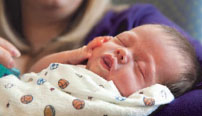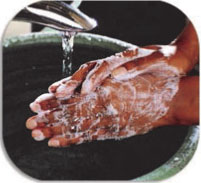Infection in the NICU
Some babies who are born have increase risk of infection especially premature infants. Infections can cause severe health problems for babies. Not all infections can be avoided; however, knowing about them and ways to help prevent them can be helpful for your baby.
Why might the risk of infection be higher for my baby?
There are many reasons for this:
• For premature babies, the body system that fights off infection (the immune system) is not yet fully working and/or is weakened by illness.
• The skin of premature babies is very thin and breaks easily which can allow germs that cause infection to enter the body more easily.
• Babies who cannot have breast milk or colostrum (mother’s first milk) are at higher risk of developing infections because breast milk helps to make the immune system stronger.
• Babies needing special care may be treated with equipment that has tubing, or with needles that must be inserted through the skin to provide medicines and fluids. Use of this equipment may increase the risk of infection.
• Medicines used to treat infections may become less helpful (called drug resistance) — this makes the infection harder to treat in some babies.
Keep in mind that infections often result from a mix of factors, including the baby’s current health.
Some babies may be born with an infection.
In these cases, the baby gets the infection from the mother either while in the womb or during delivery. Sometimes the mother may not have any outward signs of the infection and does not know that she has it. If the baby gets an infection while in the womb, it may cause physical problems in the baby. In other cases, the mother may have a type of germ that may not affect the baby in the womb, but may be passed to the baby during birth. If the mother has an infection, doctors may advise that the baby be delivered by cesarean section.
What causes infection?
Infections are caused mainly by three types of invading agents: bacteria, fungi or viruses. Sometimes you may hear people refer to these simply as “germs” or a” bug.” Each type of germ causes certain health problems which are treated with different methods.
• Candida [kan-di-duh] is a fungus that may cause severe problems. It more often affects babies weighing less than 3.3 pounds (1,500 grams) at birth. A baby may contract this during the birth process or may get it after birth, especially if he or she needs antibiotics for a period of time to treat a bacterial infection.
• Group B streptococcus [strep-tuh-kok-uh s] is a bacteria that is a common cause of infection in newborns. Many people carry this germ without getting sick from it. However, it can affect babies within the first week of life or up to a few weeks after birth (called late-onset infection).
• Methicillin-resistant staphylococcus [staf-uh-luh-kok-uh
 s] aureus [awr-ee-uh
s] aureus [awr-ee-uh
 s] (MRSA) is a bacteria that is resistant to some types of medicines. It may cause severe infection that is hard to treat.
s] (MRSA) is a bacteria that is resistant to some types of medicines. It may cause severe infection that is hard to treat.
How are germs spread?
Infections can be spread to babies from other people through touching, breathing, sneezing, coughing, or from clothing. Germs may be passed to the infant from the mother during delivery, through medical devices used in the care of your baby, or from your baby’s intestines, which has many bacteria. Infections may vary in severity. In some cases, they can cause brain damage, problems with muscles and movement, breathing, and/or hearing loss.
Types of infections that may affect babies include those that occur in the:
• Blood – called septicemia [sep-tuh-see-mee-uh]. Septicemia may happen in any baby. There is a higher risk for babies who have any type of needle or catheter inserted through the skin to provide medicines or food. Germs can also enter the body through an opening in the skin.
• Lungs – called pneumonia [noo-mohn-yuh]. Pneumonia may happen in any baby. There is a higher risk for it in babies who need a ventilator or Continuous Positive Airway Pressure (CPAP) machine to help with breathing. Germs can enter the body from the mouth or nose, or through tubing attached to the breathing machine.
• Tissue covering the brain and spinal cord called meningitis [men-in-jahy-tis]. Meningitis may be caused by germs that invade the womb if the mother’s water sac breaks too early (called premature rupture of membranes). It can also result from germs the baby gets after birth.
Infections may affect other parts of the body, such as the skin, bones, joints, and/or the heart. Different steps are taken to treat each type of infection based on the germ involved and any other health problems being treated. Sometimes an infectious disease specialist may be involved with care and treatment. If your infant has an infection, talk with the doctors and nurses about his or her unique needs and about any questions you may have.
How do we know if our baby has an infection?
Premature babies often do not show common signs of infection, such as a fever. Also, the signs of infection may differ with each type of germ. Some signs may include problems with breathing or with feeding, and a general lack of activity in the baby. Tests of body fluids, such as blood, urine, saliva, and spinal fluid, may be performed to confirm an infection.
What happens if our baby gets an infection?
Treatment depends on the type of infection. Often treatment includes giving medicines. Antibiotics may be used for infections caused by bacteria, and anti-fungal medicines may be used for fungal infections. With a few exceptions, most viral infections are not treated with medicines. Some babies may be treated for more than one infection while in the NICU.
Can infections be prevented?
This is a complex question. Some types of infection cannot be avoided, but may be reduced. For example, a medicine may be given to the mother before the baby’s birth and/or to the baby right after birth, before any sign of infection appears. This may happen if the doctor thinks the baby is at high risk for certain germs (such as Candida) and/or if the mother is known to carry a certain germ.
In the NICU, infection prevention steps include:*
• washing hands often;
• removing the baby from devices that require needles and tubes as soon as the baby is healthy enough;
• keeping areas very clean (sterile) while changing or cleaning needles or tubes;
• feeding the baby breast milk, when possible.
Sometimes babies with infections that are spread by direct contact may be placed in a separate room to prevent germs from spreading to other infants. You may also may nurses and doctors wearing gowns, masks and gloves when they perform certain care tasks with your baby, such as working with tubing or needles.
*Schoelonka, R.L., et al. (2006). Sustained reductions in neonatal Nosocomial infection rates following a comprehensive infection. Journal of Perinatology, 26, 176-179.
What can parents do?
Although many steps are taken to avoid infection, sometimes infections occur despite our best efforts. Studies show that taking active steps to control the spread of germs can help reduce the number of infections.
Parents can take an active role in helping to control infection in the NICU by:**
• learning about infections and how they are spread;
• providing mother’s breast milk, or even colostrum, when possible;
• taking steps to control infection after you take your baby home;
• working as partners with your health care team to follow all preventative measures;
• learning tips for good hand washing;
• being aware of other ways to control infection.
**Carey, A. J., Saiman, L., & Polin, R.A. (2008). Hospital-acquired infections in the NICU: epidemiology for the new millennium. Clinics in Perinatology, 35, 223-249.
Five things you can do to help prevent infection:

1. Clean your hands.
2. Make sure health care providers clean their hands.
3. Cover your mouth and nose when sneezing and coughing.
4. If you are sick, avoid close contact with others.
5. Get shots to avoid disease and to fight the spread of infection.
Source: The Joint Commission Speak Up Campaign
Helpful tips for keeping hands clean around your baby*
• Wash hands before and after each direct contact with your baby.
• Wash hands after:
– using the restroom
– sneezing, coughing, or blowing your nose
– touching your hair or your face
– removing gloves
– touching objects (including medical equipment) around your baby’s bed
• Use a special antibacterial hand rub for hand cleaning if there is no soap and water available.
• Dry your hands well (germs are more easily spread from wet hands than from dry hands).
• Ask the doctors and nurses if, and when, to wear gloves when you are with your baby. This is advised if you will come into contact with blood, urine, stools, vomit, or sores.
• Wash your hands before putting on gloves. Wearing gloves does not replace the need for hand washing.
• Remove gloves after leaving the baby.
• Do not re-use gloves.
• Avoid wearing rings on fingers – bacteria can collect beneath rings.
• Avoid long fingernails or false nails – bacteria can collect beneath nails.
Five Steps for Hand Washing:
1. Wet hands with clean water and apply soap (use warm water, if you can).
2. Rub hands together so soap lathers. Scrub all parts of your hands.
3. Rub hands for approximately 20 seconds (this is about the amount of time it takes to sing “Happy Birthday”).
4. Rinse hands well with clean water.
5. Dry hands with a paper towel or an air dryer. Use the paper towel to turn off the faucet and to open doors, etc., to help keep your hands germ-free.
